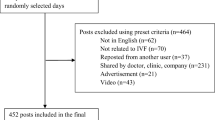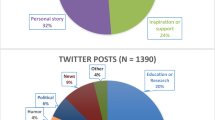Abstract
Biohacking involves individuals determining, developing, and directing relevant activities to meet their personal biological goals. Biohacking fertility is a resilient method that trans and genderqueer people use to meet their reproductive and family-planning needs in the face of historic medical marginalization and oppression. In this study, nine participants were recruited from three different Facebook groups specific to queer and trans fertility, family planning, pregnancy, and parenting. Each participant’s posts and comments to their respective Facebook group(s) were analyzed, followed by interviews with participants. A total of 1,155 Facebook posts were collected. Biohacking activity—understood as a web of activity including gathering information, applying knowledge to personal circumstances, and sharing personal experiences and knowledge—was found in each of the three groups. Participants identified these online groups as safer spaces to learn more about their own fertility and find community. Participants were active in these groups to biohack their fertility at home and to become empowered at the doctor's office or fertility clinic, ultimately achieving agency in their fertility and family planning.
Similar content being viewed by others

References
Bihani, Sipra, Michael Hartman, Florian Sobiegalla, and Amanda Rosenberg. 2015. “Comparing Network Structures of Commercial and Non-Commercial Biohacking Online-Communities.” Proceedings of the 5th International Conference on Collaborative Innovation Networks COINs15, Tokyo, Japan, March 12–14, 2015. https://arxiv.org/pdf/1503.03137
Bolderston, Amanda, and Sean Ralph. 2016. “Improving the Health Care Experiences of Lesbian, Gay, Bisexual and Transgender Patients.” Radiography 22 (3): e207–e211. https://doi.org/10.1016/j.radi.2016.04.011
Cárdenas, Micha. 2016. “Pregnancy: Reproductive Futures in Trans of Color Feminism.” Transgender Studies Quarterly 3 (1–2): 48–57. https://doi.org/10.1215/23289252-3334187
Charter, Rosie, Jane Ussher, Janette Perz, and Kerry Robinson. 2018. “The Transgender Parent: Experiences and Constructions of Pregnancy and Parenthood for Transgender Men in Australia.” International Journal of Transgenderism 19 (1): 64–77. https://doi.org/10.1080/15532739.2017.1399496
Coleman, E., W. Bockting, M. Botzer, P. Cohen-Kettenis, G. DeCuypere, J. Feldman, L. Fraser, et al. 2012. “Standards of Care for the Health of Transsexual, Transgender, and Gender-Nonconforming People, Version 7.” International Journal of Transgenderism 13:165–232. https://doi.org/10.1080/15532739.2011.700873
Coleman, E.,A. E. Radix, W. P. Bouman, G. R. Brown, Al. L. C. de Vries, M. B. Deutsch, R. Ettner, et al. 2022. “Standards of Care for the Health of Transgender and Gender Diverse People, Version 8” International Journal of Transgender Health 23 (Suppl 1): S1–S259. https://doi.org/10.1080/26895269.2022.2100644
Darwin, Zoe and Mari Greenfield. 2019. “Mothers and Others: The Invisibility of LGBTQ People in Reproductive and Infant Psychology.” Journal of Reproductive and Infant Psychology 37 (4): 341–43, https://doi.org/10.1080/02646838.2019.1649919
Ellis, Simon, Danuta Wojnar, and Maria Pettinato. 2014. “Conception, Pregnancy, and Birth Experiences of Male and Gender Variant Gestational Parents: It’s How We Could Have a Family.” Journal of Midwifery & Women’s Health 60 (1): 62–69. https://doi.org/10.1111/jmwh.12213
Epstein, Rachel. 2018. “Space Invaders: Queer and Trans Bodies in Fertility Clinics.” Sexualities 21 (7): 1039–58. https://doi.org/10.1177/1363460717720365
Estevez, Samantha, Atoosa Ghofranian, Stephanie Brownridge, Baruch Abittan, and Randi Goldman. 2020. “Insurance Coverage for LGBTQ Patients Seeking Infertility Care.” Fertility and Sterility 113 (4): e44. https://doi.org/10.1016/j.fertnstert.2020.02.095
Family Equality Council. 2019. LGBTQ Family Building Survey. January 2019. https://www.familyequality.org/fbs
Grant, Jaime, Lisa Mottet, Justin Tanis, Jack Harrison, Jody Herman, and Mara Keisling. 2011. Injustice at Every Turn: A Report of the National Transgender Discrimination Survey. Washington, DC: National Center for Transgender Equality and National Gay and Lesbian Task Force. https://transequality.org/sites/default/files/docs/resources/NTDS_Report.pdf
Institute of Medicine. 2011. The Health of Lesbian, Gay, Bisexual, and Transgender People: Building a Foundation for Better Understanding. Washington, DC: The National Academies Press. https://www.ncbi.nlm.nih.gov/books/NBK64800/
James, Sandy, Jody Herman, Susan Rankin, Mara Keisling, Lisa Mottet, and Ma’ayan Anafi. 2016. The Report of the 2015 U.S. Transgender Survey. Washington, DC: National Center for Transgender Equality. https://transequality.org/sites/default/files/docs/usts/USTS-Full-Report-Dec17.pdf
Jin, Helen., and Shoumita Dasgupta. 2016. “Disparities Between Online Assisted Reproduction Patient Education for Same-Sex and Heterosexual Couples.” Human Reproduction 31 (10): 2280–84. https://doi.org/10.1093/humrep/dew182
Kirubarajan, Abirami, Priyanka Patel, Shannon Leung, Bomi Park, and Sony Sierra. 2021. “Cultural Competence in Fertility Care for Lesbian, Gay, Bisexual, Transgender, and Queer People: A Systematic Review of Patient and Provider Perspectives.” Fertility and Sterility 5 (115): 1294–1301. https://doi.org/10.1016/j.fertnstert.2020.12.002
Lee, Rebecca. 2015. “Forced Sterilization and Mandatory Divorce: How a Majority of Council of Europe Member States’ Laws Regarding Gender Identity Violate the Internationally and Regionally Established Human Rights of Trans People.” Berkeley Journal of International Law 33 (1): 114–52. https://heinonline.org/HOL/P?h=hein.journals/berkjintlw33&i=120
Light, Alexis, Juno Obedin-Maliver, Jae Sevelius, and Jennifer Kerns. 2014. “Transgender Men Who Experienced Pregnancy after Female-to-Male Gender Transitioning.” Obstetrics & Gynecology 124 (6): 1120–27. https://doi.org/10.1097/AOG.0000000000000540
Lowik, A. J. 2018. “Reproducing Eugenics, Reproducing While Trans: The State Sterilization of Trans People.” Journal of GLBT Family Studies 14 (5): 425–45. https://doi.org/10.1080/1550428X.2017.1393361
Macapagal, Kathryn, Ramona Bhatia,and George Greene. 2016. “Differences in Healthcare Access, Use, and Experiences Within a Community Sample of Racially Diverse Lesbian, Gay, Bisexual, Transgender, and Questioning Emerging Adults.” LGBT Health 3 (6): 434–42. https://doi.org/10.1089/lgbt.2015.0124
Malatino, Hill. 2017. “Biohacking Gender: Cyborgs, Coloniality, and the Pharmacopornographic Era.” Angelaki 22 (2): 179–90. https://doi.org/10.1080/0969725X.2017.1322836
Mamo, Laura. 2013. “Queering the Fertility Clinic.” Journal of Medical Humanities 34 (2): 227–39. https://doi.org/10.1007/s10912-013-9210-3
Mamo, Laura, and Eli Alston-Stepnitz . 2015. “Queer Intimacies and Structural Inequalities: New Directions in Stratified Reproduction.” Journal of Family Issues 36 (4): 519–40. https://doi.org/10.1177/0192513X14563796
McDonald, Cece. 2015. Captive Genders: Trans Embodiment and the Prison Industrial Complex. Oakland: AK Press.
Morris, Alex. 2017. “Can You Biohack Your Fertility?” Science Experiments. October 25, 2017. https://www.thecut.com/2017/10/can-you-biohack-your-fertility.html
Nixon, Laura. 2013. “The Right to (Trans) Parent: A Reproductive Justice Approach to Reproductive Rights, Fertility, and Family-Building Issues Facing Transgender People.” William. & Mary Journal of Race, Gender and Social Justice 1 (20): 73–103. https://heinonline.org/HOL/P?h=hein.journals/wmjwl20&i=86
Obedin-Maliver, Juno, and Harvey Makadon. 2016. “Transgender Men and Pregnancy.” Obstetric Medicine 9 (1): 4–8. https://doi.org/10.1177/1753495X15612658
Olivares, Lissette. 2014. “Hacking the Body and Posthumanist Transbecoming: 10,000 Generations Later as the Mestizaje of Speculative Cyborg Feminism and Significant Otherness.” NanoEthics 8 (3): 287–97. https://doi.org/10.1007/s11569-014-0203-0
Tornello, Samantha, and Henny Bos. 2017. “Parenting Intentions Among Transgender Individuals.” LGBT Health 4 (2): 115–20. https://doi.org/10.1089/lgbt.2016.0153
Verlinden, Jasper. 2012. “Transgender Bodies and Male Pregnancy: The Ethics of Radical Self-Refashioning.” In Machine: Bodies, Genders, Technologies, edited by Michaela Hampf and MaryAnn Snyder-Korber, 107–36. Heidelberg: Universitaetsverlag Winter.
Von Doussa, Henry, Jennifer Power, and Damien Riggs. 2015. “Imagining Parenthood: The Possibilities and Experiences of Parenthood Among Transgender People.” Culture, Health & Sexuality 17 (9): 1119–31. https://doi.org/10.1080/13691058.2015.1042919
WHO (World Health Organization). 2014. Eliminating Forced, Coercive and Otherwise Involuntary Sterilization: An Interagency Statement. Geneva: World Health Organization. http://apps.who.int/iris/bitstream/handle/10665/112848/9789241507325_eng.pdf?sequence=1
Wierckx, Katrien, Eva Van Caenegem, Guido Pennings, Els Elaut, David Dedecker, Fleur Van de Peer, Steven Weyers, Petra De Sutter, and Guy T’Sjoen. 2012. “Reproductive Wish in Transsexual Men.” Human Reproduction 27 (2): 483–87. https://doi.org/10.1093/humrep/der406
Wilchins, Riki. 2011. Queer Theory, Gender Theory: An Instant Primer. Bronx, NY: Magnus Books.
Wu, Harold, Ophelia Yin, Brent Monsieur, Jessica Selter, Lillian Collins, Brandyn Lau, and Mindy Christianson. 2017. “Lesbian, Gay, Bisexual, Transgender Content on Reproductive Endocrinology and Infertility Clinic Websites.” Fertility and Sterility 108 (1): 183–91. https://doi.org/10.1016/j.fertnstert.2017.05.011
Yaish, I., K. Tordjman, H. Amir, G. Malinger, Y. Salemnick, G. Shefer, M. Serebro, F. Azem, N. Golani, Y. Sofer, N. Stern, and Y. Greenman. 2021. “Functional Ovarian Reserve in Transgender Men Receiving Testosterone Therapy: Evidence for Preserved Anti-Mullerian Hormone and Antral Follicle Count Under Prolonged Treatment.” Human Reproduction 36 (10): 2753–60. https://doi.org/10.1093/humrep/deab169
Yetisen, Ali. 2018. “Biohacking.” Trends in Biotechnology 36 (8): 744–47. https://doi.org/10.1016/j.tibtech.2018.02.011
Acknowledgments
The author would like to thank their online biohacking community and their partner Jean, who sustained them as they biohacked their own fertility and grew their family. Additionally, the author would like to thank Dr. RunningHawk Johnson for providing encouragement and feedback from this project’s inception and Liz Siler for her unending support as this piece was developed.
Author information
Authors and Affiliations
Corresponding author
Ethics declarations
I confirm that this work is original and has not been published elsewhere, nor is it currently under consideration for publication elsewhere. I have no conflicts of interest or financial interests to disclose.
Additional information
Publisher’s note
Springer Nature remains neutral with regard to jurisdictional claims in published maps and institutional affiliations.
Endnotes
1 A note on language: Within this paper, trans is used as an expansive term to include a host of identities such as transgender, trans, genderqueer, and more. Similarly, throughout the literature review, queer is used as an expansive word over LGBT and other variants, and trans is explicitly used to reflect studies that specifically consider individuals within trans communities. The author also acknowledges that not all people who are intended to be included with the terms queer and trans identify or relate with these labels. Language around sexuality and gender is “permanently unstable” and definitions often operate through exclusion, thus the language used throughout this article is meant to be expansive by intentionally not defining all terms and identities explicitly (Wilchins 2011, 43).
2 Malatino ultimately suggests that transhumanism and capitalism are pervasive, and thus no biohacking is untouched by these underlying values.
3 Sterilization is not limited to trans people and has been a eugenics tactic used against people of color, people with disabilities, and other marginalized communities. Those with intersecting marginalized identities are especially vulnerable to such practices (for example, trans women of color). These compounding marginalizations become clear when considering the high rates of incarceration for trans women of color, who are often only allowed to be housed among those with the same gender identity if they have undergone surgeries tantamount to sterilization (McDonald 2015).
Rights and permissions
Springer Nature or its licensor (e.g. a society or other partner) holds exclusive rights to this article under a publishing agreement with the author(s) or other rightsholder(s); author self-archiving of the accepted manuscript version of this article is solely governed by the terms of such publishing agreement and applicable law.
About this article
Cite this article
Wright, S. Biohacking Queer and Trans Fertility: Using Social Media to Form Communities of Knowledge. J Med Humanit 44, 187–205 (2023). https://doi.org/10.1007/s10912-022-09776-9
Accepted:
Published:
Issue Date:
DOI: https://doi.org/10.1007/s10912-022-09776-9



